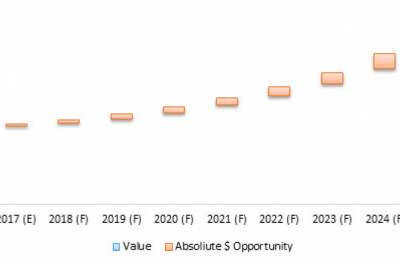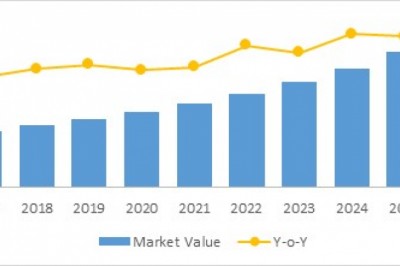views

The global Plastic Waste Management Market size is projected to reach USD 41.58 billion by 2027, exhibiting a CAGR of 3.1% during the forecast period. Unchecked plastic pollution levels during the COVID-19 pandemic is expected to create unique growth opportunities for the market, The COVID-19 outbreak has triggered a race for production personal protective equipment (PPE), which are mostly made from plastic. However, their sustainable disposal, especially the disposal of single-use plastic, has sparked fears among environmentalists and academicians as PPE contain large amounts of micro-plastics. For example, the World Wide Fund estimates that if just 1% of the 1 billion masks used in Italy every month are discarded improperly, it could lead to accumulation of 10 million plastic masks in environment, causing unprecedented pollution. In such a dire scenario, efficient plastic waste management techniques can be instrumental in tackling the long-term threats posed by skyrocketing plastic pollution levels, further fueled by the coronavirus pandemic. However, owing to supply chain disruptions, the market growth will be moderate for the present year.
List of Players Profiled in the Plastic Waste Management Market Research Report are:
- Envac Group (Sweden)
- Recology (USA)
- Stericycle Inc. (USA)
- Remondis AG & Co. Kg (Germany)
- Covanta Holdings Corporation (USA)
- Biffa PLC (U.K.)
- SUEZ Group (France)
- TANA Oy (Finland)
- ALBA Group (Germany)
- Republic Services Inc. (USA)
- Hitachi Zosen Corporation (Japan)
- Clean Harbors Inc. (USA)
- Veolia Environment S.A. (France)
- Waste Management Inc. (USA)
Market Driver
Proactive Initiatives by Governments to End Plastic Pollution to Boost the Market
Governments worldwide are taking decisive steps to curb the menace of plastic pollution, which is likely to stoke the plastic waste management market growth in the coming years. For example, in June 2019, Canada, with the world’s longest coastline, announced that it will be banning single-use plastic products by 2021. In the US, cities such as San Diego are actively prohibiting the use of Styrofoam, a commonly used plastic in disposable dishes, spoons, and forks. Even in developing economies, the efforts towards removing or minimizing plastic use is gaining momentum. For example, in January 2019, Peru ordered the ban of single-use plastics in protected natural parks and national museums across the country. The success of these initiatives wholly depends on the effective implementation of plastic waste management methods, which augurs well for this market.
Gain More Insights into the Plastic Waste Management Industry Research Report
https://www.fortunebusinessinsights.com/plastic-waste-management-market-103063
Regional Insights
High Plastic Consumption to Augment the Market in Asia Pacific
In 2019, the market size in Asia Pacific was at USD 11.08 billion and the region is expected to dominate the plastic waste management market share during the forecast period. The region’s leading position is attributable to the high per capita plastic consumption and waste generation in the developing countries of India, China, and Vietnam, with China being the largest contributor among these.
North America boasts of a robust plastic waste processing infrastructure, which is supported by a strong presence of well-established solid waste management companies in the region. These companies also have a deep and entrenched distribution network, which further strengthens the regional market.
In Europe, initiation of programs such as “The European Green Deal”, which are aimed at conserving the environment and reducing pollution, will primarily drive market growth.












